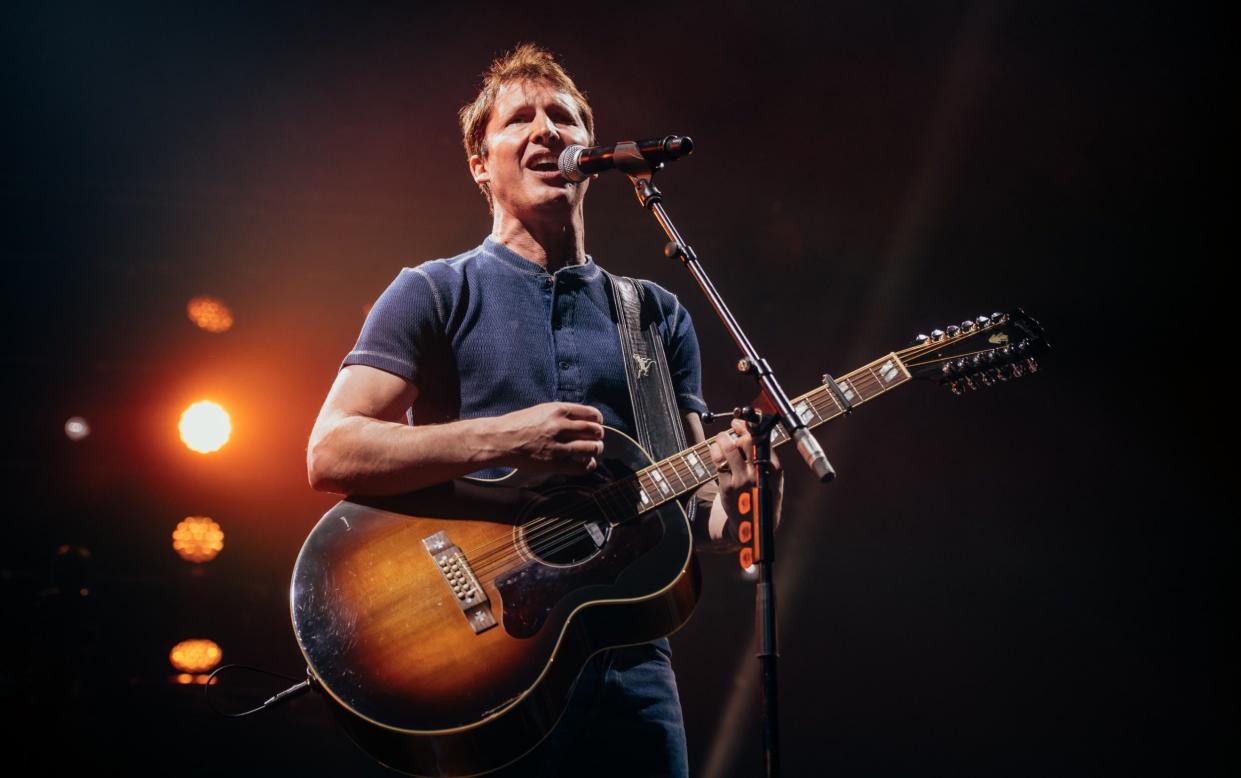James Blunt, Wembley Arena, review: life is beautiful in the middle of the road

There’s a lot to unpack at a James Blunt concert. At Wembley Arena on Saturday night, the singer, dressed in a blue t-shirt, dark jeans and white trainers, looked less like a successful troubadour and more like a member of the audience who’d hopped up on stage with an acoustic guitar and a collection of hyper-wrought songs (in which the next line could always be, “For God’s sake, can you not see that I love you?”).
Addressing the crowd, he made no effort - to his credit - to mitigate a cut-glass accent with Mockney twangs or estuary vowels. Towards the end of his 110-minute performance, for reasons best known only to himself, he donned a gasmask and ran through the crowd during a cover version of Coz I Luv You by Slade that somehow sounded no different from the other vaguely up-tempo numbers strewn across his 20-song set. All of this served to rouse and inspire a gathering that at all times seemed far more intimate than it actually was.
On a rainy evening, Wembley Arena may have been far from full - lulls in the set permitted just enough time to wonder from where one might source enough black cloth to hide unsold seats on all three sides of the room - but when Blunt and his capable four-piece band struck up Wisemen, the evening’s second song, pockets of the uncommonly polite crowd were up and dancing. With an hour to go, a request that they stand for the rest of the show was met with universal consent until the end.
For the most part, it was engaging stuff. On the tour’s opening night, in Brighton last Thursday, Blunt joked that this “Greatest Hits Tour” would consist of him playing You’re Beautiful 22 times in succession, but in truth there’s more to him than that. Early favourites such as High and Goodbye My Lover were greeted like old friends, while newer songs The Greatest and Monsters garnered responses that went beyond mere good manners. The latter track is a paean to the singer’s father, who is suffering from chronic kidney disease. As with so much of the set list, the writing is on the nose.
Away from the stage, Blunt has fallen into the loveable habit of denigrating his own already widely (and unjustly) denigrated music on social media. Following Neil Young’s decision to withdraw his albums from Spotify, the 47-year old threatened to release more material if the streaming giant continued to provide a platform to the controversial podcaster Joe Rogan.
Despite this quirk, however, 18 years after the release of the 11-million selling Back to Bedlam album, the singer occupies an unusual and rather special place in British music today. In this feast-or-famine age, domestic singer-songwriters are either superstars (Adele, Ed Sheeran) or else not much at all.
Like much of his music, Blunt has settled on an enduring space right down the middle. “I can’t believe I’m playing Wembley Arena for the first time,” he said, toward the top of the set. Then came the first in a long line of self-effacing smiles. “Mind you,” he remarked, “the stadium is right across the street. I’ll be playing there next year.” He won’t be, of course, as he well knows. But that’s okay, because James Blunt is surely, and rightly, content with what he’s got.
On tour in the UK in February. Tickets and details: www.jamesblunt.com/tour
